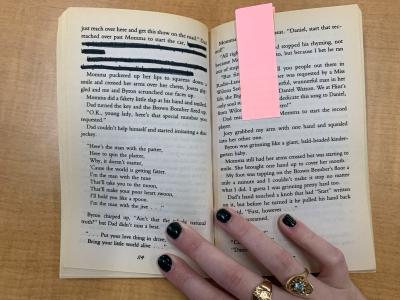
When Wilmette librarian Carly Stauss was in the sixth grade, her class read Christopher Paul Curtis’s The Watson’s Go to Birmingham. She recounts, “We were always excited when the teacher handed out new books for us to read, but this time was different. When we opened them, we noticed that many words and paragraphs had been inked out with black marker, and a few kids even got reprimanded when they were caught trying to read the words through the markings.”
Stauss, who attended a private school governed by a board of parents, considered the situation more annoying than problematic at the time. “It wasn’t until I was working on a censorship project in college that I realized the topic hit much closer to home. I picked up a copy of the book from the library to compare it with my own and read the passages that I wasn’t allowed to see the first time around.”
Blacking out passages in a classroom book is an explicit example of censorship. There’s also “soft censorship” like exiling a title to a remote corner of the library or simply opting not to order it for a library collection based on its characters or subject matter. These actions directly challenge intellectual freedom – the right to read, seek information, and speak freely. Intellectual freedom is a core value of libraries and a basic right in our democratic society. It ensures that we have access to multiple viewpoints, expressions and ideas.
Last month at the library, we engaged our patrons in conversation about intellectual freedom by asking a simple question:
“What book made you think about the world in a different way?”
Displays in both adult and youth services departments were soon covered with titles submitted by patrons and library staff. They included books from almost every genre and age level.
These books reflect the varied interests of our community and their openness to reading expansively. Our library is committed to making sure you will always be able to find something that will make you think about the world in a different way, whether its history told through a first-person lens or a sci-fi read that offers a unique perspective.
As for Carly, her early experience with censorship led to a career dedicated to intellectual freedom. “Flash forward a few years, I make my living providing (uncensored!) books to kids, and don’t regret a single thing. I like to think of it as a tiny rebellion against the person with the black marker who inked up my book all those years ago, and those who continue to do it today.”